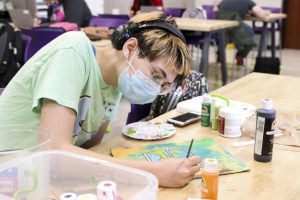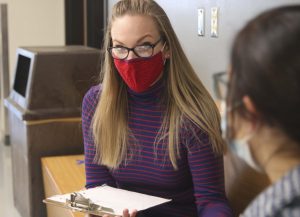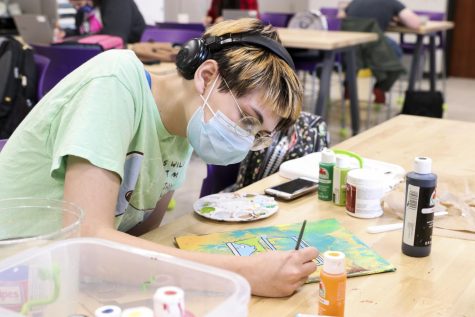Coronavirus hits ESOL teacher Lijun Zhu’s hometown
February 13, 2020
On Jan. 31, the World Health Organization declared a national health emergency in response to a coronavirus outbreak in Wuhan, China. The coronavirus, dubbed COVID-19, continues to spread throughout Hubei Province, home to nearly 60 million people and considered a transportation hub.
ESOL teacher Lijun Zhu is a Chinese citizen and has lived in Kansas for 13 years. Zhu was selected by a grant program to teach Chinese at PHS in 2007. The program ended in 2009 and Zhu moved to Wichita for a short time before returning to PHS to teach ESOL. Her family lives in Wuhan and near Hubei Province and was concerned for her family after the outbreak mid January.
“I told them to be careful, to not go to places where there are a lot of people,” Zhu said. “Suddenly, on Jan. 23, my hometown Wuhan shut down. [My family] didn’t realize it was that serious until that day because they were not educated enough about how quick the virus would spread.”
Shortly after Wuhan shut down, Zhu’s aunt tested positive for COVID-19.
Fortunately, my cousin is a doctor in Wuhan and she had to call somebody to get her into the hospital. If she was not a doctor, we probably [wouldn’t have] gotten her into the hospital.
— Lijun Zhu
Globally, there are roughly 50,000 cases and 1,500 deaths. The United States has 14 confirmed cases, all under a federal quarantine. 600 charter flight travelers are also being quarantined in the U.S.
According to Zhu, her aunt is stabilized but the virus outbreak has complicated her mother’s healthcare.
“My mom has high blood pressure and heart disease,” Zhu said. “She actually went to the hospital three times, but she cannot get treatment from the hospital because they focus on the virus patients.”
Centers for Disease Control and Prevention state that unreliability of some testing kits and lack of access to kits in China has clouded an accurate count of coronavirus cases and deaths. The New York Times reports that authorities in Hubei Province have authorized doctors to diagnose more cases without kits.
The shutdown initiated medical tests in every home to identify symptoms. In addition, citizens have been put on residential quarantine, halting work and limiting travel outside of homes to only buy essentials.
“From each family, only one person can go out and get groceries [about] every three days because they have to limit the travel,” Zhu said. “They have to have a permit to go out and come in. At the gate for each residential complex, people stand there [for clearance].”
In addition to governmental efforts, Zhu says citizens are taking further precautions.
“Whenever they go out, they have to wear the mask, and I told my parents to wear the raincoat. Anything to protect yourself,” Zhu said. “And every time they come in they have to spray the alcohol [on themselves].”
In response to the outbreak, the United States has imposed a two-week travel ban on all travelers who have recently been in China, abiding by medical parameters that report the maximum incubation period to be two weeks.
Zhu says her plans to travel to China over the summer have been complicated by the travel ban and she relies on WeTalk, a mobile communication platform, to keep in touch with her relatives.
“This virus actually helped my family get closer. We contact each other frequently, ask each other how you’re doing every day since my grandma and my uncle cannot leave. They have to be isolated for at least 20 days,” Zhu said. “Some of my cousins bring some food to them since it’s hard for my grandma. She’s not independent. My uncle is taking care of her.”
Health organizations around the world have yet to definitively solve how the virus is passed. The CDC advises people to practice basic preventive measures for respiratory diseases, including washing hands, refraining from touching the eyes or mouth and to be cautious around coughing and sneezing.














